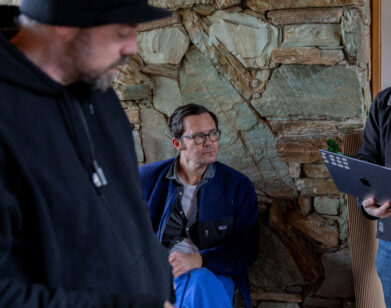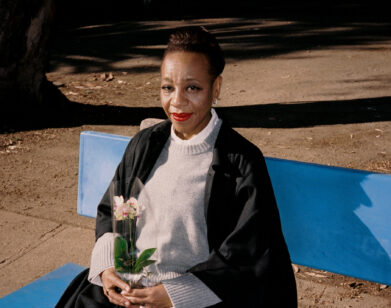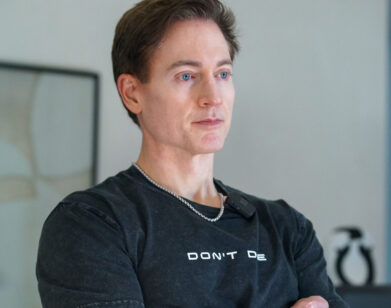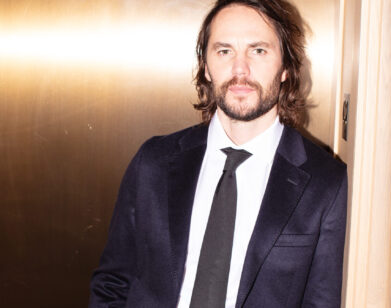Noah Baumbach Was the Kid Who Fell Asleep on the Couch at Dinner Parties
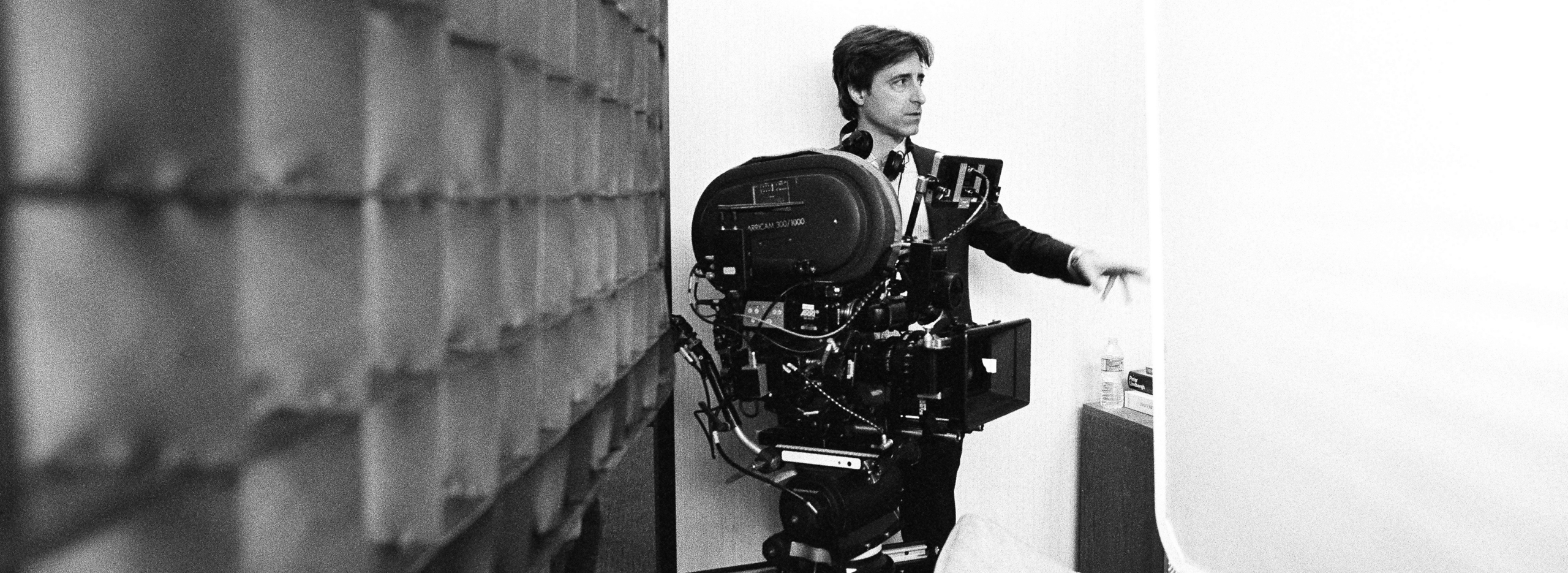
The state of the neurotic love story would not be the same without the New York-bred director Noah Baumbach. Over the course of his 25-year career, the modest, somewhat mousy director has brought us Kicking and Screaming, a film about preppy college grads attempting adulthood; Mr. Jealousy, a story about a paranoid writer on the hunt to find love; and The Squid and the Whale, a black comedy about crusty geezers breaking up.
Baumbach’s films, filled with wit and candor, shed a light on the inner lives of the urban intelligentsia, the kind of people who spend their weekend hours in secondhand bookstores. The director’s latest film, Marriage Story—which screened at the Toronto Film Festival in September, and is currently in theaters ahead of its Netflix release on December 6—is a fitting next step, a tender drama following a playwright and an actress (Adam Driver and Scarlett Johansson) who attempt an amicable divorce. All goes to hell, of course, once divorce lawyers get involved. The result is a tragicomedy that captures the lifeblood of contemporary love, from imbalanced connections to shared custody, cheating, and carseat make-outs.
Baumbach himself is no stranger to divorce. His parents—both writers; his dad Jonathan Baumbach was a film critic and author of 12 novels, and his mom, Georgia Brown, a former film critic at the Village Voice—divorced in 1983 when he was 14. Baumbach and his ex-wife, Jennifer Jason Leigh, went their separate ways in 2010. That said, the film isn’t autobiography as much as a reflection of the current state of marriage and its pitfalls for a certain subset of contemporary America. (Many of whom are Baumbach’s friends.)
Baumbach is the filmmaker in residence at Metrograph cinema on New York’s Lower East Side until December 22. He has curated 20 films to screen, half of which are his own, while the rest are some of his biggest influences, from Spike Lee to Steven Spielberg. The director hopped on a phone call with us from a car on a freeway stuck in traffic somewhere in Los Angeles to talk bumper stickers, the drama of divorce, and falling asleep on the couch at dinner parties.
———
NADJA SAYEJ: Hi Noah, how are you?
NOAH BAUMBACH: I’m good.
SAYEJ: You actually interviewed Adam Driver for this magazine a few years ago, right?
BAUMBACH: I remember, yeah.
SAYEJ: Something Adam said is that the relationship between actor and director is parental, because actors need approval. Do you feel that way?
BAUMBACH: I think there are aspects of it that certainly, when you’re working on a film set, can fall into that role. But just by design. They’re playing in front of you and want your approval on some level. You’re there to give them direction. But it can shift into the other direction. There are other times where it feels more like brother-brother, or brother-sister, or going into it like peers. All those other things can pop up on a movie set. You want to be aware of them but not make too much of them.
SAYEJ: Right now, you’re having this retrospective-type screening series at the Metrograph in New York. How did you first find out about it?
BAUMBACH: Jake Perlin, the programmer, one of the founders, I’ve known for many years. He went to school with my younger brother, has worked at BAM and Film Forum, and is an important film voice in New York for awhile now. When he told me that he and Alex were starting it, I was happy.
SAYEJ: It’s pretty sophisticated.
BAUMBACH: It’s playful, too. I like how they screen sophisticated European, international films, as well as stuff like Johnny Dangerously.
SAYEJ: You selected to screen a bunch of films all throughout this and next month, like The Long Goodbye directed by Robert Altman from 1973, which is hilarious! A classic.
BAUMBACH: It’s a wild one. So many things.
SAYEJ: Crooklyn by Spike Lee, ET by Steven Spielberg, and Working Girl by Mike Nichols—your taste is across the board.
BAUMBACH: I think it is. I picked films that were a companion to my movies. The Long Goodbye goes with Greenberg. I also worked with Elliott Gould on my first film Kicking and Screaming. I’ve always been a big fan of his, and Robert Altman movies. His view of Los Angeles is very—he has a specific way of looking at it. Even though there’s a genre aspect to that film, it has an aspect to it where it feels like a hangout movie in Los Angeles, and that is what Greenberg was, as well.
SAYEJ: So, if you had to come up with a bumper sticker about L.A. that was written by Robert Altman, what would it say?
BAUMBACH: [Laughs] Oh, boy! Um. I don’t know, Robert Altman was great not only with L.A., but doing it with Shortcuts, too. Whether he was in Nashville or England, he had an outsider’s eye on these places with a hint of satire. But there was an affectionate quality, so his films felt lived-in by the culture, and the landscape, as well. This is a very long bumper sticker I’m giving you… it’s going to wrap around the car.
SAYEJ: Three times!
BAUMBACH: Yeah.
SAYEJ: I was in Venice for the premiere of Marriage Story at the Venice Film Festival. It was great! But so crazy with long lineups, busy crowds, and water boats. How do you handle it, from the boats to the crowds?
BAUMBACH: Well, we went from Venice directly to Telluride Film Festival, which, from a visual standpoint, to have such landscapes of beauty in front of you, two of the most beautiful places on earth in different ways, it was almost jarring. But in terms of Venice, I found it exciting to be there. You want that from a big, international film festival. You know? To feel like it’s alive and everything’s happening. It’s amazing, you do take boats everywhere. Venice is one of those places you read about and see pictures of, where you assume, if you actually lived there, it wouldn’t be as unique as that, but when you actually go there, this is what you do. Take boats.
SAYEJ: Its magical.
BAUMBACH: Yeah.
SAYEJ: Something I’ve noticed about Marriage Story with the press interviews you have done, is that even though the film is fictional, people want to draw a parallel to your personal life and your own divorce. How does that make you feel?
BAUMBACH: [Laughs] I mean, all my movies, I get some version of this. It doesn’t bother me, one way or another. I’m only able to make these movies when they become fiction. I might jot down observations from life or things that happen to me or people I know, which become notes in a notebook and then sit around for a long time. Once I see what the story is, it’s always imaginative and fictional. Then I can start writing it and working on it. They don’t happen otherwise.
SAYEJ: It’s such a timely topic because roughly half of marriages end in divorce nowadays. I even have friends who have “divorce parties” now.
BAUMBACH: Mmhmm. I was given an album by the country singer David Allan Coe. The record is called “Just Divorced,” and you can just imagine the album cover, which has a car with all these cans attached to the back of it. So, I guess that’s another version of the divorce party.
SAYEJ: Divorce parties are like blasting the Macarena and drinking rosé right out of the bottle.
BAUMBACH: [Laughs]
SAYEJ: It brings out the crazy in people. Something you brought out in the film is how petty divorces can get.
BAUMBACH: Well, from a filmmaking standpoint, it isn’t unlike a thriller thing or a courtroom procedural, where something that is set up is just an ordinary part of life becomes a dramatic thing later on in the movie. In the course of divorce, that can seem quite petty, but it can become part of a dramatic, important thing. Like, once it becomes a line of argument for a lawyer.
SAYEJ: Lawyers are a huge part of it, for sure. I’m wondering if there’s a lesson in the film from your own divorce, or through your friends or making a movie about it, to help people get through their own situation?
BAUMBACH: Well, someone said to me: “In the movie, they get a divorce, so you don’t have to.”
SAYEJ: That’s good!
BAUMBACH: Maybe that’s the lesson.
SAYEJ: Go through the drama onscreen and leave it there. That sounds like an ideal relationship.
BAUMBACH: Yeah. I think movies do that in subtle ways all the time.
SAYEJ: You don’t strike me as someone who is very dramatic in your personal life.
BAUMBACH: It depends on what you mean by dramatic. [Pause]. I don’t know how I would answer that.
SAYEJ: I’ve heard that on set you never say “action” before you start a scene. Is that true?
BAUMBACH: Yes, that is true. I feel like I’m always trying to blur the lines between before the camera rolls, during and after, so that we’re always just behaving, just there. “Action,” by design, creates a “start acting, here-it-goes” kind of thing. It makes sense if you’re doing a car chase and you yell it over a bullhorn and have everything go full bore—then it’s a good word for it. But for me, it feels like once we’re slated and the camera is ready, we have the game plan, we know the scene is blocked and everyone knows their lines, it’s like, leave it to the actors to start. Then we’ll follow.
SAYEJ: What’s the best or worst dinner party you’ve ever been to and why?
BAUMBACH: Oh wow. The best dinner parties were when I was a kid, I sat with the adults for a short period of time and I was let into the adult world and listened in on their conversations. There are references that are beyond you but sound interesting. I remember hearing about people talking about The Band or names like Cripple Creek and things that sounded exciting to me. The later part of that, you get tired, your parents want to stay, then you’re still listening to everybody, but you’re sleeping on a couch. I always liked that as a kid.
SAYEJ: I hear a clicking sound. Are you pulled over at the side of a road?
BAUMBACH: No, but I’m in a car. But I’m being driven so I don’t have to do anything.
SAYEJ: What do you see out the window?
BAUMBACH: Traffic. We are sitting in traffic and up ahead is one of those flashing signs with three arrows pointing to three lanes telling us “you’re all going to have to merge into one single lane.” And its far up ahead to know we’re going to be bumper-to-bumper for a little while now.
SAYEJ: The proverb of Los Angeles, I suppose.
BAUMBACH: Yes, it is.

